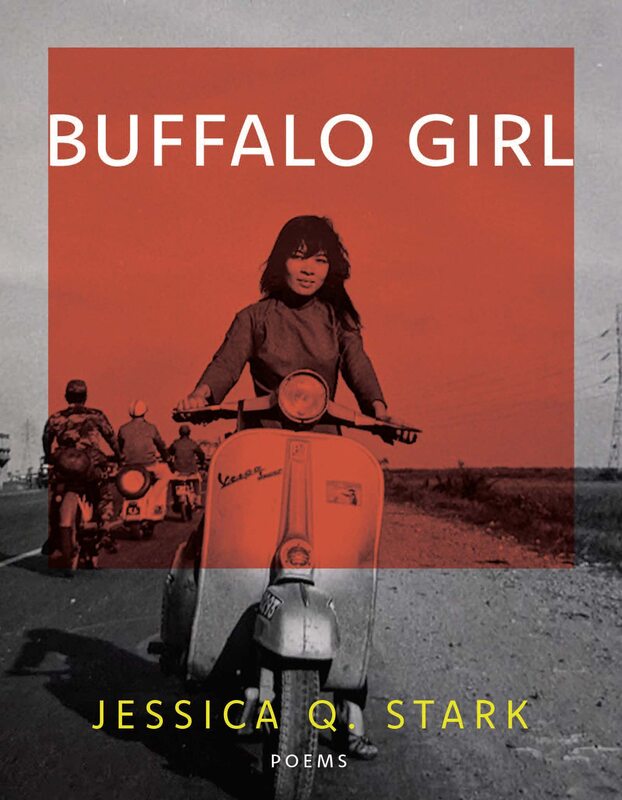|
The Breadcrumbs widget will appear here on the published site.
By Alex Carrigan In her new poetry collection Buffalo Girl, Jessica Q. Stark presents a series of poems that speak of violence against women’s bodies through a variety of cultural, national, and personal histories. The majority of the collection follows Stark’s mother, who immigrated to the US following the Vietnam War, and parallels her story through multiple reinterpretations of the Little Red Riding Hood fairy tale. Along with her use of collage photography, Stark’s hybrid poems present an incredible story of survival and autonomy through a dangerous trek through the woods. Stark’s collection is divided into three sections. The first section introduces the reader to the Red Riding Hood theme that carries through the entire collection. The first poem, “Phylogenetics” opens with a rhyme from the fairy tale before Stark writes “When it began isn’t clear, but isn’t it obvious that / we always had a knack / for stories about little girls in danger?” Stark begins her deconstruction of the fairy tale in this section by presenting a series of erasure poems where she turns the different versions of the story from authors like the Brothers Grimm and Charles Perrault into poetry. In the version by V. Wilmsen, Stark writes “WHO’S THERE? / said the latch, / dark and rough. / In a timid tone she cried, THE CHILD, / POINTED / AND WILD.” It's also in this section that Stark begins to write about her mother and her background as a Vietnamese immigrant. This section depicts several collage images depicting her mother as a young woman, often with some element cut out and replaced with scenes of nature. A photo of Stark’s mother on a moped, a recurring image throughout the collection, is edited on top of some plants next to the poem “Ballad of the Red Wisteria,” where Stark writes, “Is red love / with a knack / for breaking code / first memories: / sure, first / memories of home / include a / pick-pocket/ or two…” following an explanation of red wisteria as an invasive species in the US. The next section begins with a series of prose poems that directly supplant the Red Riding Hood story into Vietnam. In these pieces, the Red figure is seduced by a wolf figure who has the air of death around him. “Linh says his mouth smells like rotting flesh. Thin cigarettes hang from its ends. At night, the world is full of sky and erasure,” she writes in “A Wolf Promises Happiness, or Still Life as a Fruit Basket.” This ultimately leads into the format breakdown of “Hungry Poem in the Language of the Wolf,” which features a photo of a man in uniform whose face has been replaced with tree branches. “No, there isn’t room for that kind of grief // out here on laughter’s buoy,” Stark writes, “out here // where all the women in my line know the woods before their beds.” The final section brings the story more into the post-Vietnam war era and present day. Here, Stark writes several poems entitled “Kleptomania,” each depicting and analyzing what it means to steal. “Kleptomania, 1993” opens with the lines “Or the fact that I cannot / talk about stealing / without mentioning women / mostly do it or at least / are more punishable for the / crime of taking what’s / not rightfully theirs.” It’s also in this section that Stark analyzes the Red Riding Hood story in comparison to other figures, real and imagined, such as writing about Vietnamese figures like Triệu Thị Trinh, or Lady Triệu, in the poem “Buffalo Girl” (“ Commander that slayed you built / fallacies to try and keep you / still / Poor men and their / fantasies of time and blood / that pass only during the duration of war”). By connecting the fairy tale with other stories and figures, Stark manages to find some connection with her mother and her history of violence, in a way that suggests an understanding of the past and what may come. In the final poem “Aubade with Buffalo Girls in Flight,” Stark writes, “Mother, I owe you my face. I owe you an / uninterrupted life, which is to say, I owe you nothing for / what I left out of this catalogue. Still, I owe you for tender volume, / or the way I never told you I cried after / driving you home to the airport that year.” Buffalo Girl is the emergence out of dark woods and the threatening forces as told through one poet’s attempt to reconcile and understand her family’s history. By reinterpreting and playing with universal storytelling elements, Stark’s collection is an ode to strength and survival, of how to see the root of nature in all and how to understand how one grows up in difficult scenarios. It’s a meditative and emotional collection that understands that staying on the forest path may not be the safest, but it can still be the quickest way out.
0 Comments
CommentsYour comment will be posted after it is approved.
Leave a Reply. |
AuthorWrite something about yourself. No need to be fancy, just an overview. Archives
March 2024
Categories
All
|



 RSS Feed
RSS Feed






